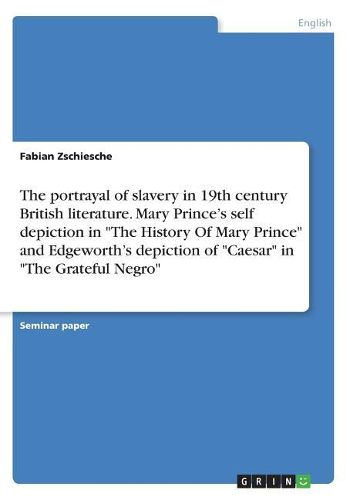Readings Newsletter
Become a Readings Member to make your shopping experience even easier.
Sign in or sign up for free!
You’re not far away from qualifying for FREE standard shipping within Australia
You’ve qualified for FREE standard shipping within Australia
The cart is loading…






Seminar paper from the year 2009 in the subject English Language and Literature Studies - Literature, grade: 1,3, Friedrich-Alexander University Erlangen-Nuremberg, language: English, abstract: Although the British participation in the triangle of slavery is clearly evident, the number of publications on abolitionist texts could not compete with those being published by American authors. But the British were the first to abolish slavery officially in 1807 and therefore it appears to be appropriate looking at British abolitionist texts more closely. Many British narrations on slaves have a protagonist who should appeal to the readership in a positive way by depicting him in very European style which means to ascribe several positive features to him as looking European, being educated and civilized and so on. Those created texts can of course only give a very limited insight into the life of an African slave, whereas an account as given by Mary Prince for instance claims its status of being authentic. Therefore I will take a closer look at her narration with respect to her self-depiction, especially the way her role as female slave is portrayed and to what extent physical abuse and ill-treatment plays a crucial role within her story and within the system of slavery as such. Furthermore I will briefly analyze Pringle’s role as editor of the text and how far he has influenced the authenticity of Prince’s narration. In order to show some contrastive writing, I will examine the role of Edgeworth’s grateful negro and whether her fictional writing can be considered an abolitionist piece of literature or not.
$9.00 standard shipping within Australia
FREE standard shipping within Australia for orders over $100.00
Express & International shipping calculated at checkout
Seminar paper from the year 2009 in the subject English Language and Literature Studies - Literature, grade: 1,3, Friedrich-Alexander University Erlangen-Nuremberg, language: English, abstract: Although the British participation in the triangle of slavery is clearly evident, the number of publications on abolitionist texts could not compete with those being published by American authors. But the British were the first to abolish slavery officially in 1807 and therefore it appears to be appropriate looking at British abolitionist texts more closely. Many British narrations on slaves have a protagonist who should appeal to the readership in a positive way by depicting him in very European style which means to ascribe several positive features to him as looking European, being educated and civilized and so on. Those created texts can of course only give a very limited insight into the life of an African slave, whereas an account as given by Mary Prince for instance claims its status of being authentic. Therefore I will take a closer look at her narration with respect to her self-depiction, especially the way her role as female slave is portrayed and to what extent physical abuse and ill-treatment plays a crucial role within her story and within the system of slavery as such. Furthermore I will briefly analyze Pringle’s role as editor of the text and how far he has influenced the authenticity of Prince’s narration. In order to show some contrastive writing, I will examine the role of Edgeworth’s grateful negro and whether her fictional writing can be considered an abolitionist piece of literature or not.